Eurozone: Stop Putting the Cart Before the Horse!
Adelina Marini, July 15, 2016
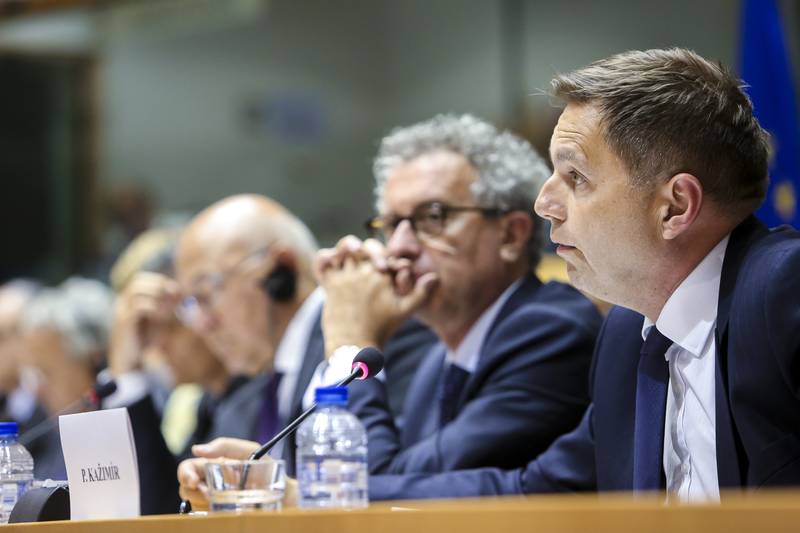 The Brexit threw the future of the euro area into uncertainty. This becomes evident from reactions after the referendum in Great Britain of June 23rd, which rekindled discussions of the future of the EU and the 19-member currency block in particular. There is no doubt that integration must continue, but there are fundamental differences as to how and when should this integration continue. At this stage it seems that the winning camp is the one of those who think no sudden movements should be made and more effort should be put into making existing mechanisms and instruments start to work. The first serious reaction with a concrete vision of the future came from the engine of integration in the EU and the euro area in particular – France and Germany. The foreign ministers of the two countries Frank-Walter Steinmeier and Jean-Marc Ayrault published on June 28th their ideas on how the EU should continue after the Brexit.
The Brexit threw the future of the euro area into uncertainty. This becomes evident from reactions after the referendum in Great Britain of June 23rd, which rekindled discussions of the future of the EU and the 19-member currency block in particular. There is no doubt that integration must continue, but there are fundamental differences as to how and when should this integration continue. At this stage it seems that the winning camp is the one of those who think no sudden movements should be made and more effort should be put into making existing mechanisms and instruments start to work. The first serious reaction with a concrete vision of the future came from the engine of integration in the EU and the euro area in particular – France and Germany. The foreign ministers of the two countries Frank-Walter Steinmeier and Jean-Marc Ayrault published on June 28th their ideas on how the EU should continue after the Brexit.
Their document is named “A strong Europe in a world of uncertainties” and it contains a special chapter on the future of the euro area. It is admitted that requirements for membership in the common currency and fiscal consequences stemming from it have turned out way-higher than what was expected when the euro was first created. It is therefore appropriate that the will of the rest to decide on their own when to join the common currency is to be respected. So far, no one has forced countries outside the euro area, which have a commitment by contract to join when they fulfil the criteria, and furthermore there is no specific time limit mentioned in the treaties. It was always presumed, however, that this should be the ultimate goal, and recently EC boss Jean-Claude Juncker provoked irritation among non-euro states by stating that they must join as soon as possible.
Paris and Berlin are of the opinion that it is time the euro area entered a new phase of economic cohesion and therefore political governance which will provide the balance between obligations and solidarity. The two states fully support deepening of integration in the euro area, but appeal for doing it carefully and with small steps. In their opinion the road should be towards supranational structures, which would report to a special European Parliament subcommittee, which would deal exclusively with euro area issues. It is necessary somewhere ahead in the future that the boss of the Eurogroup start reporting to a parliamentary body, which is comprised of members of the European Parliament and representatives of national parliaments. This chamber of sorts must have full jurisdiction on issues, connected with the fiscal and macroeconomic oversight.
France and Germany fully support the idea that the current euro area bailout fund –the European Stability Mechanism (ESM) – turns into a full-fledged European monetary fund, which is placed under parliamentary control. This would mean the euro area acquiring a budget of its own – the so called fiscal capacity, provided for in the five presidents’ report of June of last year. At this stage there are vast differences within the Eurogroup as to how should this budget look and the discussion in the European Parliament’s economic committee of Monday (July 11th), with the participation of seven finance ministers from the euro area, was a great illustration of those differences. There was scepticism as well during previous discussions of the subject in the EP’s economic committee.
Paris and Berlin are suggesting that a good starting point would be a weak form of a budget as early as of 2018, which would be targeted exclusively at supporting investment in member states, which have been affected the worst by the crisis. The two countries will form a workgroup to lead the discussions on this matter. France and Germany also reconfirm in their document their commitment to a harmonisation in the taxation and social policies.
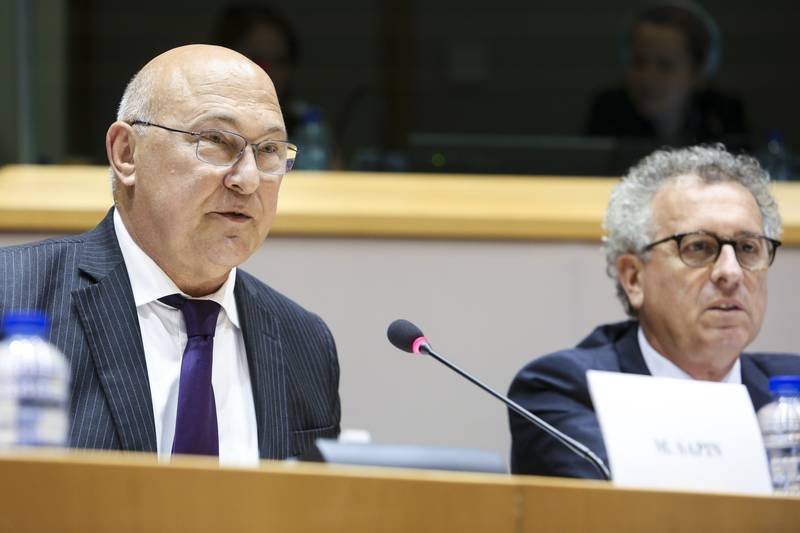 Apart from France and Germany, there are two MEPs working on a future euro area budget as well, currently drafting a report on the subject. The project is once again French-German in a sense, for it is being drafted by French MEP Pervenche Berès (Socialists and Democrats) and her German colleague Reimer Böge (EPP). In their opinion, having common monetary policy without a common fiscal policy is impossible to resolve the issue of asymmetric shocks in the euro area (the different way a given crisis is reflected in the different corners of the currency pact). Simple coordination of national fiscal policies is insufficient. They also appeal for the euro area’s bailout fund taking up the role of a European Monetary Fund with a clearly set mandate, with the ability to lend money and take credits, and be managed by the European Commission, under European Parliament supervision.
Apart from France and Germany, there are two MEPs working on a future euro area budget as well, currently drafting a report on the subject. The project is once again French-German in a sense, for it is being drafted by French MEP Pervenche Berès (Socialists and Democrats) and her German colleague Reimer Böge (EPP). In their opinion, having common monetary policy without a common fiscal policy is impossible to resolve the issue of asymmetric shocks in the euro area (the different way a given crisis is reflected in the different corners of the currency pact). Simple coordination of national fiscal policies is insufficient. They also appeal for the euro area’s bailout fund taking up the role of a European Monetary Fund with a clearly set mandate, with the ability to lend money and take credits, and be managed by the European Commission, under European Parliament supervision.
At a later stage it is provided for the future euro area budget (fiscal capacity) to be integrated in the common European budget – the Multiannual Financial Framework (MFF). All this should happen at clear conditions and a commitment by currency club members for economic convergence. This should happen under the hood of a convergence code, the implementation of which will guarantee access to financing by the bailout funds – a similar scenario existing in the five presidents’ report.
Guy Verhofstadt (ALDE) – former PM of Belgium and current MEP also came out recently with a similar draft of his own. As it was to be expected of him, being one of the most famous euro-federalists in the EU at the moment, he goes way further in his ideas by proposing the establishing of an EU finance minister, who is to be charged with the task of conducting the common economic, fiscal, and monetary policy and be backed by an euro area budget. The finance minister should have the power to intervene in establishing national economic and fiscal policy when the convergence code is being violated. He also suggests that the European Central Bank receives a statute of a lender of last resort.
It is exactly the ideas of Böge and Berès that were discussed on July 11th by the ministers of finance of Luxembourg, Malta, France, Italy, Slovakia, The Netherlands, and Greece. Several of them were enthusiastic and welcomed them, others, however, pulled the handbrake and appealed there is no hassle. French Minister of Finance Michel Sapin (socialist), in the spirit of the French-German document of June 28th, stated that the euro area does need a budget and it is exactly the ESM that is a good foundation for this. The future budget, however, needs monitoring and control, which means that it should be discussed and approved in the European Parliament. At this stage, however, Michel Sapin refrained from taking a particular stand, hinting that it may be possible to address the community approach, meaning everything passes through the EU’s existing institutions (i.e. the EP, the EC), but also use the intergovernmental approach, meaning an agreement outside 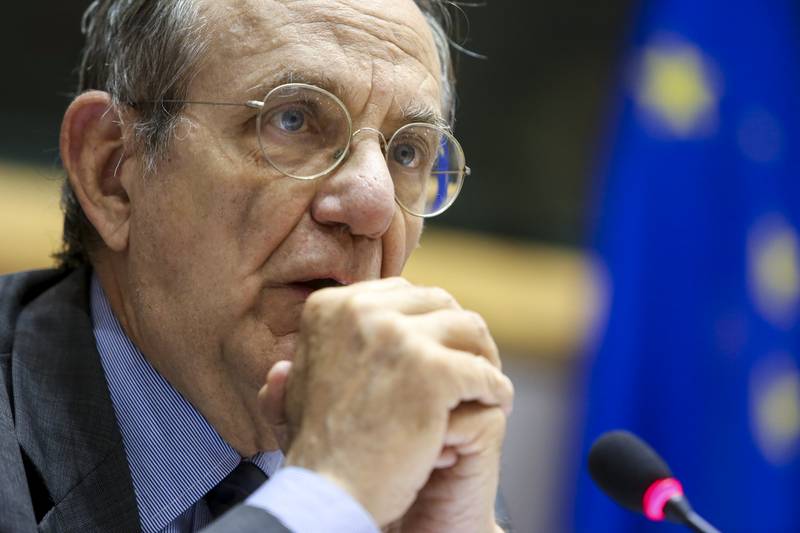 the European institutional framework. Something the EP hates to the core and does its best to avoid.
the European institutional framework. Something the EP hates to the core and does its best to avoid.
A possible reason to go towards an intergovernmental approach could be the lack of consensus within the euro area itself, the entire EU, or having founding treaties disallow it, which would mean opening the treaties for an overhaul, and everyone is unanimous now is not the time for this. Ever since the start of the crisis, intergovernmental approach has been used for both reasons. The first time was when Great Britain vetoed the adoption of the fiscal compact and it went towards an intergovernment agreement, although with a commitment to weave it in the European legal framework. The second occasion was when member states resorted to an intergovernmental agreement in order to build the second pillar of the banking union - the common bank resolution fund, because treaties were proved “too tight” for its inception.
Michel Sapin also stated that a major item in the discussion of a common euro area budget was how should it be financed. He proposed having the debate on this issue be operational, rather than institutional. This means going into specifics. His Greek colleague Euclid Tsakalotos, who is a member of a coalition government made up of far-right and far-left parties, was also fervent in supporting a common euro area budget, using scientific approach towards its justification. In his opinion, the euro area should follow the example of the USA, where, should a state get in trouble it gets aid at the federal level. This would also reflect the international role of the euro, he said. At this stage, the situation in the euro area is such that monetary policy is unable to deal with asymmetric shocks, or even symmetric ones. There is no way to resort to devaluation and fiscal policy, especially in countries that have no fiscal space. The sole shock-absorber remains to be wage rates.
How can Europe go on in an environment of sharp euro-scepticism if its sole shock-absorber is wages, asked Mr Tsakalotos. Italian Finance Minister Pier Carlo Padoan, who is also a member of a right-wing government within the euro area, has long been an advocate of a common euro area budget. He urged that the correct balance is found between policies at the national and at the European level. At the moment, the sole instrument for corrections is at the national level. In order to take it up at the European level, one would need to find the balance between risk-sharing and risk-reduction. Mr Padoan, however, concentrated on something else – a common European unemployment scheme. Italy proposed the scheme in the autumn of last year, which builds upon the earlier idea of the European Commission, which remained stillborn. Rome believes that a similar scheme will create a common labour market.
This was something that got on the nerves of Dutch Finance Minister Jeroen Dijsselbloem (also a Socialist), who presides the Eurogroup as well. He explained that unemployment schemes are almost unilaterally owned by social partners and are part of historic and cultural legacy of the member states. “One thing that triggers great alertness in my country is of Europe starting to interfere with the pension system. There’s an immediate panic because it is ours, it's very much an element of the identity of our social system”, he explained. Luxembourg Finance Minister Pierre Gramegna (a Liberal), under whose Council presidency last year the subject of the euro area future was being pushed 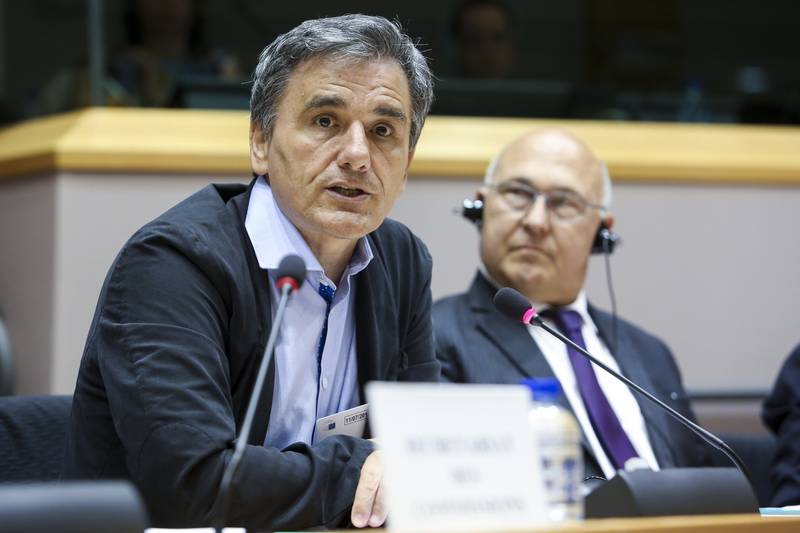 up in the agenda, was among the moderate ones during the two-hour debate on Monday evening.
up in the agenda, was among the moderate ones during the two-hour debate on Monday evening.
He feels that the euro area budget should be a long-term goal. Mr Gramegna warned, however, that there is a great danger of us getting lost along the way towards this goal, so it is important, he said, that it is done one step at a time, not underestimating the difficulties Europe is facing, not just because of the Brexit, but in general. He placed his finger straight on the wound – “Do we want more solidarity in Europe and if so, can we mobilise 27 or 28 member states around common actions?”, he asked and admitted that he himself had no answer. The euro area has 19 members and currently it is there that the highest level of solidarity is, but the danger of turning the club into a transfer union is very large, warned the minister. Once again he admitted that when the Union was created, the cart was placed before the horse. Now it is time to reverse things.
Edward Scicluna, finance minister of Malta (also Socialist), too, poured a cold shower on the enthusiasm for more integration. At the moment, the EU and the euro area in particular have enough institutions, which need to be made to work before more and more institutions are created. Scicluna warned that the euro area is very far from USA and the Brexit demonstrated that we cannot take the EU for granted. The speech of the Maltese finance minister was full of controversy, which actually illustrates very well the controversy of the whole EU. On the one hand he spoke of existing institutions and mechanisms and how they should be left alone to do their job, but on the other hand he criticised them as weak and unable to meet the challenges.
A very different point of view was proposed by Jeroen Dijsselbloem, who summarised the discussion by saying that fiscal capacity is welcomed by many, but for different reasons. He quoted the Dutch Nobel Prise for Economics Laureate Jan Tinbergen and his rule that if you have many goals and only one instrument – it leads to problems. Dijsselbloem supports the idea of gaining economic convergence first and only then go for more integration. Besides, he reminded that during the crisis there weren’t many asymmetric shocks, aiming to hint that at this stage there is no need to have a new instrument for shock absorption. He was adamantly opposed to the ESM turning into a monetary fund and urged that the euro area continues along its current plan – finishing the banking union and the union of capital markets.
The greatest sceptic, but also the most contradicting, among those who spoke was Slovak Finance Minister Peter Kažimír, whose country took over the presidency of the Council of Ministers on July 1st. He stated that under the current situation, what is called a mid-term plan will turn into a long-term one, and the long-term one into never. Fiscal capacity is namely a long-term goal. However, he thinks that a common budget is an important element of euro area stability, for euro area stability is “critically important” for the entire EU, especially after the Brexit. Peter Kažimír (Socialist) defended the idea of his Italian colleague by stating that the common unemployment scheme does not aim at replacing national schemes, but rather just to complement them. He feels, however, that at this stage the debate is purely academic. First of all it should be started with gaining uniform consent that an euro area budget is necessary, then discuss its particular form, and at the end decide how it should be financed.
The rather sceptical tone of the discussion irritated the Greek finance minister, who stated that obviously the time has come to put forward a much more pressing question – “Instead of discussing who's going to pay we need to ask ourselves do we have a common future”. Michel Sapin had a positive reply to this question. Pierre Gramegna, however, said that fiscal capacity is too ambitious of an idea, which is very difficult to gather consensus around at this stage. Besides, he urged that the rest of the countries in the EU (outside the euro area) should not be neglected. Scicluna also tightened the tone by stating that first of all there is an integrity issue to be resolved. Everyone talks about Germany, but in fact the smallest economy in the Union – Malta – feels exactly the same. Malta has the highest burden, regarding instalments to the ESM. “How can I explain to our people that they have to borrow at a higher rate in order to lend to other countries 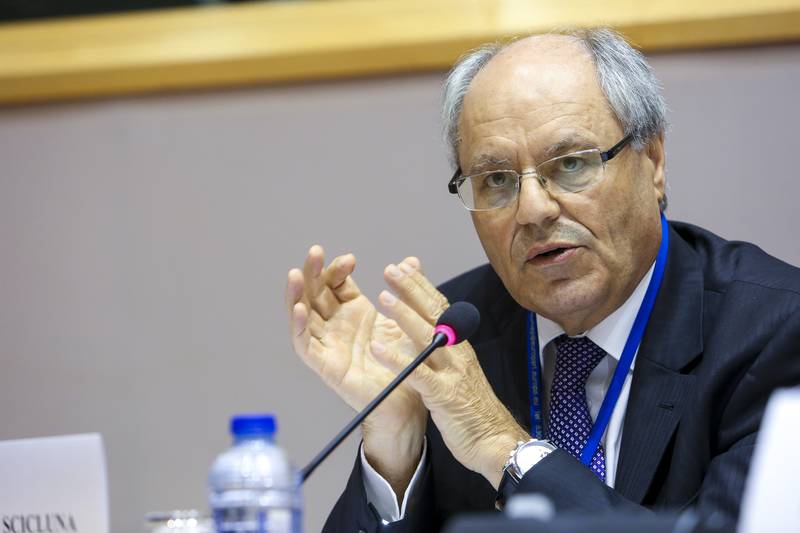 at a lower rate?”, he asked. “Before we go further, let's ensure that what we have works true”, added the Maltese minister.
at a lower rate?”, he asked. “Before we go further, let's ensure that what we have works true”, added the Maltese minister.
Jeroen Dijsselbloem was of the same opinion. First of all, we need to see who is in and who is not. You cannot just take from the system and not contribute. This is why it is very important that trust is built among member states. Only then could the point debates continue, he said. So the answer to who the horse is has already been found – the trust, Sancho. The future of the EU in general, including that of the euro area, will be the subject of an extraordinary summit in Bratislava on September 16th. So far, attitudes are not to make any sudden movements and continue after the Union’s current programme. The largest and so far unanswered problem of the Union, however, is resistance by member states to implement at the national level what they agreed on at the European level. Until this has changed, it does not matter who thinks what about the future. Scepticism will only grow.
Translated by Stanimir Stoev
 Angela Merkel, Emmanuel Macron | © Council of the EU
Angela Merkel, Emmanuel Macron | © Council of the EU Benoit Coeure | © Council of the EU
Benoit Coeure | © Council of the EU Pierre Moscovici | © Council of the EU
Pierre Moscovici | © Council of the EU